Yes, macaws can make good pets with proper care and handling. Macaws are intelligent, social birds known for their vibrant colors and playful personalities.
They require a spacious enclosure, a balanced diet of fruits, vegetables, and pellets, as well as regular mental and physical stimulation to thrive in a home environment. Macaws also need social interaction with their human caregivers and may require a significant amount of attention and training to prevent behavioral issues.
It is important to research and understand the specific needs of the macaw species before considering them as pets to ensure a suitable and enriching living arrangement.
Macaws In The Wild

Macaws in the wild showcase their natural beauty and thrive in their natural habitats. While they may be striking pets, it’s important to consider their complex needs and captivity challenges.
Brief Description Of Macaw Species In Their Natural Habitats
Macaws are magnificent and colorful parrots that are native to the rainforests of Central and South America. Let’s explore their natural habitats and understand more about these beautiful birds:
- Rainforest dwellers: Macaws inhabit the lush and vibrant rainforests, where they find abundant food and shelter. With their brilliant plumage, they bring life and color to the dense canopy.
- Ecological importance: Macaws play a crucial role in the ecosystems they call home. As seed dispersers, they assist in the regeneration of plant species by spreading seeds throughout the forest. Their natural activities contribute to maintaining a healthy and diverse rainforest ecosystem.
- Extensive range: Macaws are found in various countries across Central and South America, including Brazil, Peru, Ecuador, and Venezuela. The diversity of their habitats allows different macaw species to thrive in different forest regions.
- Social creatures: Macaws are highly social birds and often live in large flocks, with some species forming groups of hundreds. Living in these communities offers protection and better access to food sources.
- Canopy dwellers: Macaws are well-adapted to life in the trees, where they spend a significant portion of their time. They have strong beaks and agile claws that assist them in grasping branches securely, enabling them to move and perch with ease.
- Flying beauties: Macaws are exceptional flyers, displaying their impressive aerial skills as they soar through the rainforest canopy. Their long, graceful wings allow them to cover large distances while searching for food and nesting sites.
How Macaws Behave And Interact With Their Environment
When it comes to how macaws behave and interact with their environment, here are some notable traits:
- Vocalizations: Macaws have a distinct vocal range, producing loud calls that echo through the forest. Their vocalizations serve various purposes, from establishing territory to communicating with flock members.
- Feeding habits: Macaws primarily feed on fruits, seeds, nuts, and vegetation found in their natural habitats. With their strong beaks, they can crack open nuts and extract seeds from tough shells, demonstrating their remarkable feeding adaptations.
- Nesting behavior: Macaws often select tree cavities or cliff ledges to build their nests. They meticulously prepare their nesting sites, ensuring a safe and secure environment for their eggs and offspring. Some macaw species display remarkable fidelity to their nest sites, returning to the same location year after year.
- Bonding and mating: Macaws form strong pair bonds, often staying together for life. They engage in elaborate courtship displays, which involve elaborate dances, vocalizations, and intricate flight patterns. These rituals strengthen the bond between mates and facilitate successful breeding.
- Playful nature: Macaws are known for their playful behavior, engaging in various activities such as climbing, swinging, and even hanging upside down. Their playful antics not only provide entertainment but also help improve their physical agility and coordination.
- Curiosity and intelligence: Macaws exhibit inquisitive behavior, exploring their surroundings and investigating objects within their reach. Their high level of intelligence allows them to learn and mimic human speech, making them popular pets among bird enthusiasts.
Macaws are not just visually striking birds; they are fascinating creatures that are intricately connected to their natural habitats. Through their behavior and interactions, they contribute to the rich biodiversity of the rainforests they call home. Owning a macaw as a pet, however, is a considerable responsibility that requires careful consideration and commitment.
Macaws As Pets
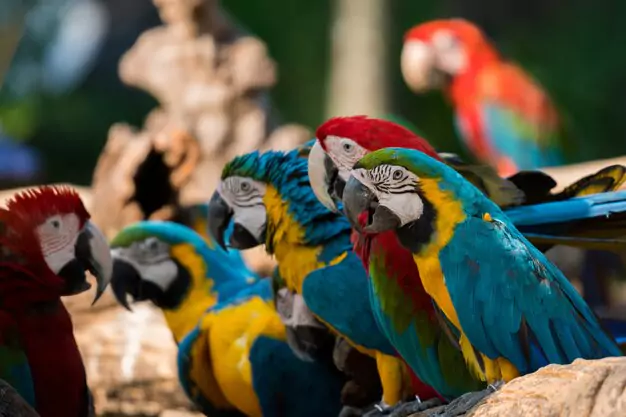
| Pros | Cons |
| Intelligence: Macaws are highly intelligent birds and can be trained to perform tricks. They can also learn to speak, although they may not be as good at it as some other parrot species. | High-maintenance: Macaws require a lot of care and attention. They need a spacious cage, a variety of toys, and a diet that is high in fruits, vegetables, and nuts. They also need to be taken to the vet for regular checkups. |
| Affectionate: Macaws are known for being affectionate birds and can form strong bonds with their owners. They enjoy being petted and cuddled. | Noise level: Macaws can be very noisy birds. If you live in an apartment or other close quarters, the noise from a macaw may be a problem. |
| Talkative: Macaws are known for being talkative birds and can be quite noisy. They may repeat words and phrases that they hear, or they may make their own vocalizations. | Destructive behavior: Macaws can be destructive if they are bored or not properly stimulated. They may chew on furniture, walls, or other objects. |
| Colorful: Macaws are some of the most colorful birds in the world. They come in a variety of colors, including blue, yellow, green, and red. | Training: Macaws can be trained to perform tricks. However, they can also be stubborn and difficult to train. |
| Long-lived: Macaws can live for a long time, up to 50 years or more. This means that you need to be prepared to make a long-term commitment if you get a macaw. | Cost: Macaws can be expensive to care for. The initial cost of purchasing a macaw, cage, and supplies can be significant. The cost of food, vet care, and toys will also add up over time. |
Macaws make wonderful pets due to their stunning colors and intelligent nature. Their playful and affectionate demeanor can add joy to any household. With proper care and attention, macaws can thrive in a loving home environment.
The Appeal Of Keeping Macaws As Pets:
Macaws are undoubtedly stunning creatures, with their vibrant plumage and impressive size. They have a unique charm that captivates many individuals, making them highly desirable as pets. Let’s explore some of the key reasons why macaws make great companion animals:
- Long lifespan: Macaws are known for being incredibly long-lived, with some species living for over 50 years. This means that if you decide to bring a macaw into your life, you can expect to enjoy their companionship for decades.
- Intelligent and social: Macaws are highly intelligent creatures, capable of solving problems and recognizing patterns. They thrive on mental stimulation and require regular interaction and socialization to stay happy and content.
- Excellent mimics: One of the most fascinating aspects of macaws is their ability to mimic human speech. With their powerful vocal abilities, macaws can learn and imitate an array of sounds, making them great entertainers and companions.
- Bonding potential: Macaws have the potential to form deep bonds with their human caregivers. By devoting time and effort to nurturing the relationship, you can establish a strong bond with your macaw that can last a lifetime.
- Aesthetically pleasing: There’s no denying the visual appeal of macaws. Their bright, beautiful feathers make a striking statement and can serve as an eye-catching focal point of any living space.
The Responsibilities And Commitment Required To Care For Macaws:
While macaws can be wonderful companions, it’s important to acknowledge the significant responsibilities and commitment involved in their care. Here are some important factors to consider before bringing a macaw into your home:
- Commitment to time: Macaws demand a considerable amount of time and attention. They thrive on social interaction, mental stimulation, and physical exercise. As a macaw owner, you need to allocate sufficient time each day to meet their needs.
- Requisite space: Macaws are large birds that require ample space to spread their wings and exercise. It’s important to provide them with a spacious cage or aviary, along with regular opportunities for supervised out-of-cage time.
- Dietary requirements: Macaws have specific dietary needs that must be met to ensure their overall health and well-being. A nutritionally balanced diet consisting of fresh fruits, vegetables, nuts, seeds, and specialized macaw pellets is essential.
- Veterinary care: Regular veterinary check-ups are crucial for maintaining your macaw’s health. Avian veterinarians specialize in bird care and can guide on vaccinations, parasite control, and any potential health issues that may arise.
- Lifelong commitment: Macaws have lengthy lifespans, and adopting one means making a lifelong commitment. A macaw can become a cherished member of your family for many years to come, so it’s important to be prepared for the long-term responsibility.
Macaws are magnificent creatures that can bring immense joy and companionship into the lives of their owners. However, it’s crucial to understand the commitment involved in their care. By carefully considering their needs and dedicating the necessary resources and time, you can provide a loving and enriched environment for your pet macaw.
Temperament And Personality
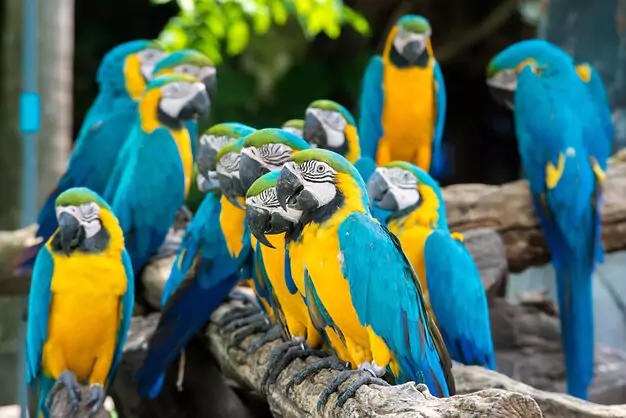
Macaws make great pets due to their friendly and playful temperament. Their vibrant personality adds charm to any household, making them a delightful and entertaining companion.
The Vibrant Personalities Of Macaws
Macaws are known for their vibrant personalities, which make them fascinating pets to have. With their striking colors and playful nature, these birds bring life and energy to any household. Let’s explore the different aspects of their temperament and personality:
- Intelligent and curious: Macaws are highly intelligent birds that love to explore their surroundings. They are quick learners and enjoy solving puzzles and playing with toys that challenge their minds.
- Social creatures: Macaws thrive on social interaction and enjoy being the center of attention. They have a natural desire to be part of the family and actively engage with their owners. They are known to bond strongly with their humans and may even view them as members of their flock.
- Playful and mischievous: Macaws have a playful side that is hard to resist. They enjoy games, interactive toys, and activities that allow them to showcase their intelligence and agility. Their mischievous nature can lead to amusing antics and moments of laughter.
- Affectionate and loving: Macaws have the potential to form deep bonds with their owners. They enjoy physical contact, such as cuddling and gentle stroking. Some macaws even enjoy being preened by their owners as a bonding experience.
- Inquisitive and vocal: Macaws are naturally curious creatures and like to explore their surroundings. They may investigate new objects or people with a sense of curiosity. Additionally, these birds are known for their loud and expressive vocalizations, which can range from playful squawks to mimicry of human speech.
- Emotionally sensitive: Macaws are emotionally sensitive creatures and can sense their owner’s mood. They can provide comfort and support during times of stress or sadness.
- Loyal and protective: Once a macaw forms a bond with its owner, it can be fiercely loyal and protective. Macaws have been known to defend their owners against perceived threats, making them excellent companions and, ultimately, members of the family.
Macaws possess vibrant personalities that make them captivating pets. Their intelligence, social nature, playfulness, and affectionate demeanor make them ideal for those seeking engaging and interactive companionship. With their unique traits and ability to form strong bonds, macaws can bring joy and laughter to their human families.
Physical Characteristics
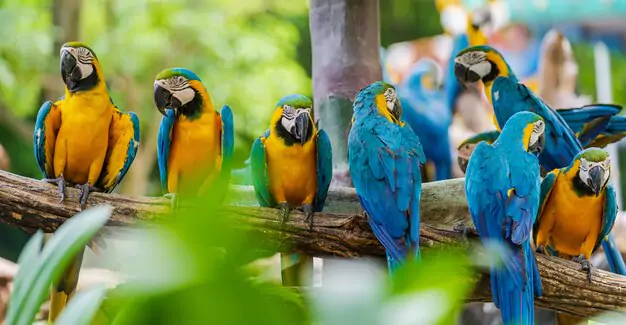
Macaws, known for their vibrant colors and impressive size, can make wonderful pets for people who are experienced and committed. They require proper care and attention to thrive in a domestic environment.
Overview Of The Distinct Features And Appearance Of Macaws:
Macaws are renowned for their stunning appearance and distinct physical characteristics. These vibrant and large parrots possess a unique set of features that make them appealing pets for bird enthusiasts. Let’s delve into the key aspects that set macaws apart:
- Size: Macaws are among the largest parrots, with some species measuring up to 3 feet (1 meter) in length. Their exceptional size ensures they become quite the center of attention in any setting.
- Plumage: One of the most striking features of macaws is their colorful plumage. Their feathers exhibit a vibrant range of hues, including reds, blues, greens, yellows, and more. This magnificent display of colors makes them a sight to behold.
- Beak: Another distinguishing feature of macaws is their powerful beaks. These robust beaks not only allow them to crack open nuts and seeds but also serve as a means for climbing and exploring their surroundings.
- Long tail: Macaws possess long, graceful tails that add to their overall beauty. These tails aid in balance while flying and enhance their elegant appearance.
- Facial patches: Some species of macaws boast distinct facial patches. These patches, also known as “facial masks,” often feature contrasting colors and patterns, further accentuating their attractive appearance.
Different Color Variations And Their Significance:
Macaws exhibit various color variations, each with its significance and allure. Let’s explore the significance of these color variations:
- Blue and gold macaws: The vibrant blue and golden-yellow feathers of these macaws symbolize their tropical origins, bringing a sense of the exotic to any environment.
- Scarlet macaws: With their brilliant red plumage and striking blue wings, scarlet macaws are a visual delight. Their vibrant colors represent passion and energy.
- Green-winged macaws: These macaws feature a stunning combination of deep green feathers accented by vibrant red and blue patterns. They symbolize vitality and harmony in nature.
- Hyacinth macaws: Possessing a vibrant blue sheen, hyacinth macaws are both captivating and rare. Their coloration signifies serenity and tranquility.
- Military macaws: Exhibiting a mix of green, brown, and red feathers, military macaws evoke a sense of strength and resilience in their appearance.
Macaws truly stand out due to their distinct physical characteristics and color variations. Their exuberant plumage and unique traits make them a popular choice for individuals seeking a captivating and beautiful pet. Whether you’re captivated by their size, colorful feathers, or imposing beaks, macaws possess a charm that’s impossible to ignore.
Socialization And Training
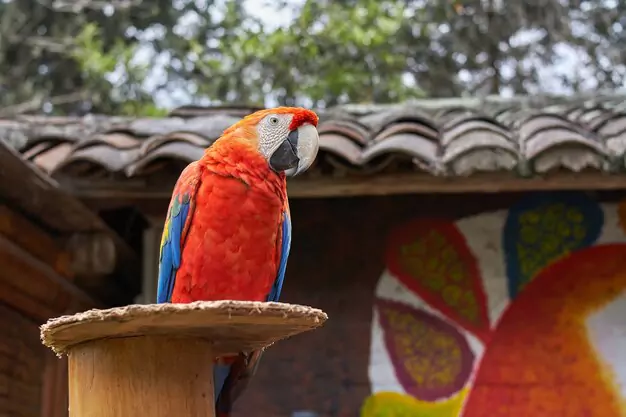
Macaws can make great pets with proper socialization and training. Their intelligent and social nature allows them to bond with their owners and be a delightful companion.
Macaws are magnificent creatures that have captured the hearts of many bird enthusiasts. If you are considering bringing a macaw into your home, it is essential to understand the importance of socialization and training for these beautiful birds. Socializing macaws from a young age is crucial for their overall well-being and ability to adapt to a domestic setting.
Additionally, training techniques can help foster good behavior and create a bond of trust between you and your pet macaw. Let’s delve into these aspects further:
The Importance Of Socializing Macaws From A Young Age:
- Macaws are highly intelligent and social birds. It is vital to expose them to a variety of people, environments, and experiences to ensure their well-rounded development.
- Early socialization helps macaws become comfortable around different individuals, reducing the chances of them becoming fearful or aggressive later in life.
- By introducing macaws to unfamiliar situations, noises, and objects, they become desensitized and less prone to stress or anxiety.
- Socialization also allows macaws to understand acceptable behavior within a household, such as interacting with family members and respecting boundaries.
Techniques For Training Macaws To Be Well-Behaved Pets:
Training macaws requires patience, consistency, and positive reinforcement. Here are some effective techniques:
- Harness and target training: Using a harness and target stick, you can teach your macaw to become comfortable with handling and being outside its cage. This training fosters a sense of freedom while ensuring the bird’s safety.
- Positive reinforcement: Reward-based training methods, such as using treats or verbal praise, can encourage desired behaviors such as stepping up on a hand or staying on a designated perch.
- Crate training: Introducing a crate as a safe and comfortable space for your macaw can be useful for managing behavior and providing a sense of security during times of stress or travel.
- Verbal commands: Teaching simple verbal commands, like “step up” or “stay,” helps macaws understand your expectations and establishes a clear communication channel between you and your pet.
- Behavior redirection: Redirecting undesirable behavior, such as excessive screaming or biting, by offering alternative activities or toys can help macaws learn appropriate outlets for their energy and instincts.
Remember, training macaws is an ongoing process. Regular interactions, mental stimulation, and socializing opportunities should continue throughout their lives to maintain their well-being and ensure a happy and well-behaved pet. With consistent effort and a positive approach, you can forge a strong bond and companionship with your macaw.
Diet And Nutrition
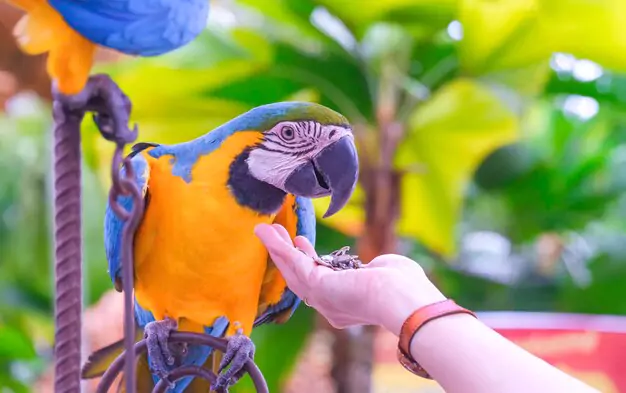
Macaws make great pets, but their diet and nutrition are crucial for their well-being. It is important to provide them with a balanced diet consisting of fresh fruits, vegetables, nuts, and high-quality bird pellets.
Macaws are vibrant and intelligent birds that captivate many people with their striking appearance and playful nature. While considering them as pets, it is essential to understand their specific dietary needs to ensure their overall health and well-being. Macaws require a balanced and nutritious diet to thrive, and here are some guidelines to provide them with the nutrition they need.
The Specific Dietary Needs Of Macaws:
- Fruits and vegetables: Incorporate a variety of fresh fruits and vegetables into the macaw’s diet to supply essential vitamins and minerals. Options such as apples, bananas, oranges, carrots, and leafy greens are excellent choices.
- Pellets: High-quality pellets formulated specifically for macaws can be a convenient and nutritionally balanced option. They provide essential nutrients and should make up a significant portion of the diet.
- Nuts and seeds: These can be given as occasional treats but should not be the primary source of calories due to their high-fat content. Provide limited amounts of almonds, walnuts, sunflower seeds, or pumpkin seeds to add variety.
- Legumes and grains: Cooked legumes like lentils, chickpeas, and quinoa, along with whole grains such as brown rice, can offer additional protein and carbohydrates to the macaw’s diet.
- Protein sources: Offer lean sources of protein like cooked chicken or fish, but avoid seasoning or adding any spices that may be harmful to the macaw. Eggs can also be included occasionally.
Recommendations For Providing A Balanced And Nutritious Diet:
- Variety is key: Offer a wide range of fruits, vegetables, and other food items to ensure a diverse nutrient intake.
- Freshness matters: Ensure that fruits and vegetables are always fresh and free from any signs of spoilage. Remove any uneaten portions promptly to maintain cleanliness.
- Avoid harmful foods: Certain foods are toxic to macaws, including chocolate, avocado, caffeine, alcohol, and high-sodium or sugary snacks. Keep your macaw’s diet free from these substances.
- Consult with a veterinarian: Seek professional advice to create a detailed and personalized diet plan for your macaw. A veterinarian specializing in avian care can provide valuable insights and recommend specific dietary adjustments based on your bird’s age, weight, and overall health.
- Hydration is crucial: Alongside a nutritious diet, provide fresh water every day to keep your macaw hydrated.
Remember, providing a well-planned and appropriate diet is essential for the overall health and longevity of your macaw. By adhering to these recommendations, you can ensure that your feathered friend thrives and remains happy and healthy for years to come.
Housing And Environment
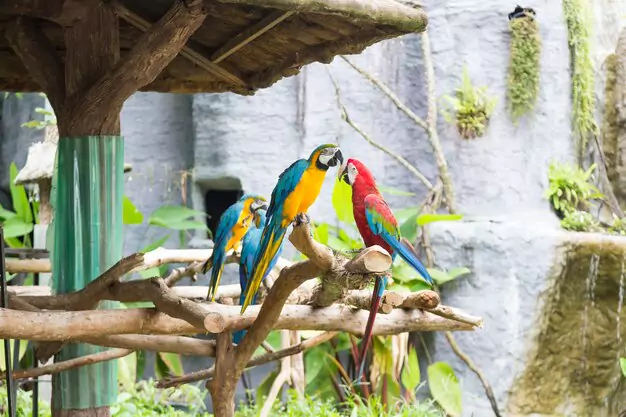
Macaws can make good pets for experienced bird owners who can provide a spacious and stimulating environment. Proper housing and environmental enrichment are essential for their well-being and happiness.
Macaws are undoubtedly stunning and vibrant birds that make an impressive addition to any household. However, before considering a macaw as a pet, it’s essential to understand their unique housing and environmental needs. Providing ideal living conditions and creating an enriching environment are vital aspects of macaw care.
Let’s explore the key factors to consider when it comes to housing and environment for these majestic birds:
Ideal Living Conditions And Cage Setup For Macaws:
- Spacious cage: Macaws are large birds that require ample space to move around and stretch their wings. Invest in a cage that allows for comfortable movement and has enough height for them to climb and perch.
- Sturdy construction: Macaws are incredibly strong, so opt for a cage made from durable materials like stainless steel to withstand their beak strength.
- Bar spacing: Ensure that the bars of the cage are appropriately spaced to prevent the macaw from escaping or getting stuck. The spacing should be narrow enough to prevent their head from passing through.
- Perches: Provide a variety of different-sized perches to promote foot exercise and prevent muscle atrophy. These perches should be made of natural, non-toxic materials like hardwood or untreated branches.
- Accessibility to food and water: Place multiple food and water dishes in different areas of the cage, making it easy for the macaw to access them. Stainless steel dishes are the best option, as they are easy to clean and durable.
- Placement of cage: Position the cage in a family-oriented area, ensuring that it is away from drafts, direct sunlight, and any potential hazards or loud noises.
Tips For Creating An Enriching Environment For Macaws:
- Toys and enrichment: Macaws are intelligent birds that require mental stimulation to stay happy and healthy. Provide them with a variety of toys, such as puzzle toys, foraging toys, and chewable items to keep them entertained.
- Social interaction: Macaws are highly social creatures and thrive on interaction. Dedicate regular time for socializing with your macaw, and engaging in activities like talking, playing, and training.
- Natural surroundings: Surround the macaw’s living area with natural elements like plants and branches, mimicking their natural habitat. This helps create a more stimulating and visually appealing environment for them.
- Secure perching spots: Macaws love having a place to observe their surroundings from above. Offer secure perching spots at different heights in the room, allowing them to feel safe and comfortable.
- Temperature and humidity control: Macaws come from tropical regions, so maintaining a suitable temperature and humidity level is vital. Avoid exposing them to extreme heat or cold, and ensure they have access to clean, fresh air.
Remember, a healthy and fulfilling environment is crucial to a macaw’s overall well-being. By providing spacious and stimulating living conditions, along with plenty of social interaction and mental enrichment, you can create a nurturing and happy home for your macaw companion.
So, are macaws good pets? With proper housing and an enriching environment, they can indeed thrive and become wonderful additions to your family.
Considerations Before Getting A Macaw

Considering the responsibilities and commitment required, it is important to carefully think about the suitability of macaws as pets. Their long lifespan, large size, and extensive care needs should be carefully considered before getting a macaw.
Macaws are majestic and beautiful birds, known for their vibrant colors and impressive size. Many people are drawn to the idea of having a macaw as a pet, but it’s important to carefully consider some key factors before bringing one into your home.
Factors To Consider Before Bringing A Macaw Into Your Home:
- Space: Macaws are large birds and require a significant amount of space to thrive. They need a spacious cage where they can stretch their wings and move around comfortably. Additionally, they need ample room outside of the cage for daily exercise and playtime.
- Time commitment: Macaws are highly social birds that require a considerable amount of time and attention from their owners. They thrive on interaction and can become lonely and bored if left alone for long periods. You should be prepared to spend several hours each day engaging with and providing mental stimulation for your macaw.
- Noise level: Macaws are known for their loud vocalizations, which can be a source of delight for some and a nuisance for others. If you live in an apartment or have close neighbors, you should consider whether you and those around you can tolerate the noise that macaws can produce.
- Longevity: Macaws can live for several decades, with some species reaching ages of 60 years or more. Before getting a macaw, it’s essential to consider whether you’re ready for the long-term commitment and responsibility that comes with caring for a bird that will be a significant part of your life for many years.
- Financial resources: Owning a macaw can be expensive. In addition to the initial cost of purchasing a bird and a suitable cage, there are ongoing expenses for food, toys, veterinary care, and potential emergencies. It’s crucial to ensure that you have the financial means to provide for your macaw’s needs throughout its life.
- Lifestyle compatibility: Macaws thrive in environments with consistent routines and low stress levels. If you have a hectic and unpredictable lifestyle, a macaw may not be the best pet for you. These birds require stability and a calm atmosphere to feel secure and happy.
- Training and socialization: Macaws are intelligent creatures that benefit from training and socialization from an early age. Consider whether you have the time and patience to train your macaw and expose them to different experiences, environments, and people.
- Allergies: Some people may have allergies to bird dander, feathers, or dust. Make sure you and anyone in your household are not allergic to macaws before bringing one into your home.
- Life companion: Macaws form deep bonds with their owners and can suffer from separation anxiety if they are not given enough attention and interaction. Ensure that you can provide the love and companionship that a macaw needs throughout its life.
- Legal considerations: It’s essential to check with your local authorities regarding any specific permits or regulations that may be required to own a macaw in your area. Ensure that you comply with all legal requirements before bringing a macaw into your home.
Considering all these factors is crucial before deciding whether a macaw is the right pet for you. Macaws can bring tremendous joy and companionship, but they also require a commitment of time, effort, and resources. Take the time to evaluate your readiness for this responsibility to ensure that you can provide the best possible care for a macaw in your home.
Potential Challenges Of Owning A Macaw

Owning a macaw as a pet can come with potential challenges. These include their long lifespan, their need for social interaction and mental stimulation, their large size, and their tendency to produce loud vocalizations. However, with proper care and attention, macaws can make wonderful pets for those who are dedicated to meeting their unique needs.
Addressing Potential Challenges Of Owning A Macaw
Macaws are magnificent birds known for their colorful plumage and vibrant personalities. These intelligent creatures can make wonderful companions, but it’s crucial to understand the challenges that come with owning a macaw. Here, we’ll delve into the potential issues you may encounter as a macaw owner and provide insights to help you navigate them:
- Space requirements: Macaws are large birds and need spacious cages to thrive. Ensure you have enough room in your home to accommodate a cage that allows for ample flying and movement.
- Dietary needs: Macaws have specific dietary requirements, predominantly consisting of a variety of fruits, vegetables, nuts, and seeds. Providing a nutritionally balanced diet is essential for their overall health and well-being.
- Noise levels: Macaws are naturally vocal creatures, and their calls can be loud. If you have close neighbors or live in an apartment complex, this might be a concern. Keep in mind that macaws thrive in an environment where they can socialize and vocalize freely.
- Long lifespan: Macaws have an impressive lifespan, often living for several decades. Before bringing a macaw into your home, carefully consider the long-term commitment and the implications of caring for a bird that may outlive you.
- Social needs: Macaws are highly social animals and thrive on interaction with their human caregivers. They require daily mental stimulation, companionship, and socialization to prevent boredom and potential behavior problems.
- Feather destruction: Some macaws may develop a destructive behavior known as feather plucking or self-mutilation. This can occur due to stress, boredom, or health issues. Understanding the causes and providing appropriate environmental enrichment is essential to minimize the risk of this behavior.
- Training and behavioral issues: Macaws are intelligent birds that require mental stimulation and positive reinforcement training. However, they can also be strong-willed and exhibit challenging behaviors. Patience, consistency, and understanding are key to effectively managing and redirecting any unwanted behaviors.
- Allergies and health risks: It’s important to be aware that macaws, like other birds, can produce allergens that may trigger allergies in some individuals. Additionally, they can be prone to specific health conditions, such as respiratory issues and beak and feather disease. Regular veterinary check-ups and a clean living environment are vital for their well-being.
- Financial commitment: Owning a macaw can be expensive, with costs including food, cages, toys, and regular veterinary care. Be prepared for the financial commitment required to provide a safe, healthy, and enriched life for your macaw.
- Legal considerations: Before bringing a macaw into your home, ensure you are aware of any regional or national laws and regulations regarding their ownership. Some macaw species are protected, and permits may be required.
Understanding these potential challenges and being prepared to address them is crucial for anyone considering a macaw as a pet. With the right knowledge, care, and commitment, a macaw can bring immense joy and companionship to your life for many years to come.
Frequently Asked Questions Of Are Macaws Good Pets
Are Macaws Good For Beginners?
Macaws are not recommended for beginners due to their high maintenance and specific care requirements. They are large, intelligent, and social birds that need a lot of attention, space, and mental stimulation. Macaws can become aggressive if not properly trained and can be destructive with their strong beaks.
Their large size also makes them more challenging to handle and control compared to smaller birds. Additionally, macaws have a long lifespan, often living for several decades, which is a significant commitment. For beginners, it is better to start with a smaller and less demanding bird species that can help gain experience in bird care and handling.
Ultimately, any decision to keep a macaw should be made with careful consideration of the time, effort, and resources required to provide them with a suitable living environment.
Are Macaws Hard To Take Care Of?
Macaws can be challenging to care for due to their high energy levels and specific needs. These majestic birds require a spacious cage, regular socialization, mental stimulation, and a specialized diet consisting of fresh fruits, vegetables, and nuts. Lacking proper care, macaws can develop behavioral issues like excessive screaming or feather plucking.
It’s crucial to provide them with ample time outside of their cages for exercise and to interact with their owners to prevent boredom. Additionally, regular veterinary check-ups and a clean environment are essential for their well-being. Macaws are long-lived birds that require a significant commitment of time, resources, and expertise.
If someone is willing to put in the necessary effort, macaws can make wonderful companions, but potential owners should thoroughly research and understand their care requirements before committing.
Do Macaws Like To Be Held?
Macaws enjoy being held and value physical affection from their owners. They form strong bonds and appreciate the closeness with their human companions. Regular handling and gentle interaction are vital for their social and emotional well-being. Holding a macaw helps them feel secure and loved, strengthening the bond between the bird and the owner.
It is important to approach macaws with care and respect their boundaries. While some macaws may be more comfortable with handling than others, patience and gradual acclimation will help build trust. Always be mindful of the bird’s body language and signals to ensure that they are comfortable during handling sessions.
Remember to offer positive reinforcement and rewards to encourage their cooperation and create a positive experience for both birds and humans.
Do Macaws Get Aggressive?
Yes, macaws can display aggressive behavior. Their aggression may stem from various reasons, including fear, territoriality, or the desire to protect their mate or offspring. Aggression in macaws can involve biting, screaming, or lunging. Proper socialization, training, and a stimulating environment can help reduce aggression in macaws.
It’s important to establish boundaries and provide positive reinforcement to discourage aggressive behavior. Seeking guidance from an avian behaviorist or experienced macaw owner can help manage and modify aggressive tendencies. Providing a balanced diet, regular exercise, and mental stimulation can contribute to a healthier and calmer macaw.
Remember, understanding and addressing the underlying causes of aggression are crucial in ensuring the well-being of your macaw.
Conclusion
Having a macaw as a pet can be an incredibly rewarding experience for those who are willing to invest the time, effort, and resources necessary to provide them with a suitable environment. These majestic creatures bring vibrant colors, intelligence, and charm into our lives.
However, it is important to consider the potential challenges of owning a macaw, such as their long lifespan, need for mental stimulation, and potential noise level. Macaws require proper care, including a balanced diet, regular vet check-ups, and social interaction.
It is also crucial to obtain a macaw from a reputable source, ensuring their well-being and preventing illegal wildlife trade. With the right commitment and dedication, a macaw can become a beloved member of the family, providing companionship and joy for many years to come.








